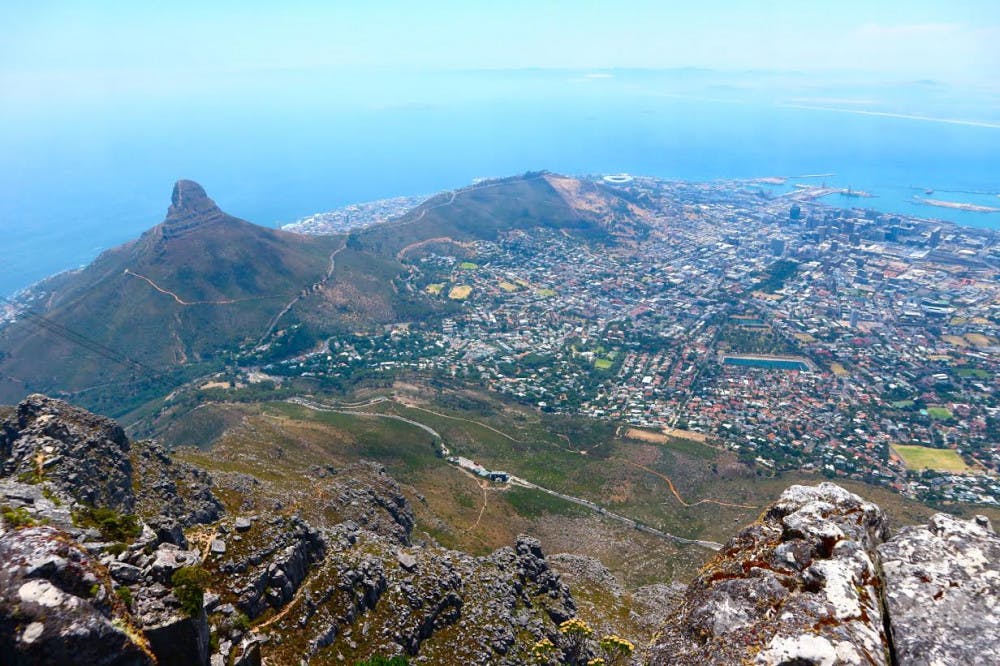By Sierra Stivala
Correspondent
Literature is often our best attempt at preserving history, but textbooks can’t convey the anguish heard in oppressed voices. And documentaries don’t transmit the coarseness of battled soils.
With this in mind, the College designed a winter study abroad program to South Africa. For three weeks, nine students traveled around the country, immersing themselves in a post-apartheid culture that is still experiencing the effects left behind from systematic segregation.
Program directors Matthew Bender and Mindi McMann intended for the trip to expose students of the College to the ethnic, racial and gender issues that have plagued South Africa. The goal of the experiential learning course was for students to foster a global perspective that would follow them back home.

“I feel the trip exceeded our expectations,” Bender said. “In terms of academic content, it was rigorous and fulfilling. The students were able to match up the assigned readings with field experiences in a powerful way.”
The course itself had students reading various novels and short stories that detailed the origins and rise of the apartheid system, the effects of which still linger today.
“Because apartheid was a relatively recent historical event, there is still so much in South African life that stems from this struggle,” said Rebecca Dalton, a senior secondary education and history dual major who attended the trip.
“What was surprising and fascinating was how much pride these people have in their country and how far they’ve come and how proud they are to be South African,” said Alyssa Keenan, a junior secondary education and English dual major who also attended the trip.
The trip gave students the opportunity to experience everything from mountains and monuments to festivities and food. Students’ first stop was the vibrant city of Johannesburg. There, students visited the Apartheid Museum, Pilanesberg Game Reserve and a historic mine. They also toured the Cradle of Humankind, a United Nations Educational, Scientific and Cultural Organization World Heritage site that houses limestone caves and ancient fossils.
The remainder of the trip was spent in Cape Town, an area that has come to be known as a cultural melting pot. Its diversity ranges from the beaches of Camp Bay to the iconic Table Mountain, one of the seven natural wonders of the world. While visiting the Muslim community of Bo Kaap, students were given a personalized tour by a member of the community.
“I felt as if (the guide) was telling us a story instead of giving us facts,” junior elementary education and English major Lauren Monaco said.
The students were further immersed in the Bo Kaap culture by attending a cooking class, which was taught in a resident’s home.
While in Cape Town, they were also able to attend local theater productions, wine tours and sporting events. A resident of an area that was formerly known as District Six even gave them a tour of the infamous area while providing a personal account of the hardships the district’s people endured under apartheid rule. On another day, students painted a mural in the children’s tuberculosis ward at the Brooklyn Chest Hospital.
However, a trip to Cape Town would not be complete without a visit to the breathtaking Table Mountain. The mountain overlooks the city and climbing it was a highlight of the trip for Keenan.

Above all, the trip exposed students to the inhumanities from which many Americans are largely sheltered.
“Poverty in America does not compare to how it looks in South Africa, and I found myself even more grateful for the life and opportunities we have here,” Monaco said.
Hearing the language and seeing the daily struggles of people in South Africa left a lasting impact on the students.
“This course has taught me to look at the little things in addition to the big picture,” Dalton said. “There is so much to be learned from everyday life.”
The first year of the program was an overwhelming success, according to those who went on the trip, including senior secondary education and English dual major Christine Yarish.
“I never imagined that I would be watching the sunrise from the peak of Lion’s Head mountain, chilling with penguins on the beach, reliving the physical steps of Nelson Mandela and speaking with dozens of locals who inspire my memories,” Yarish said.







